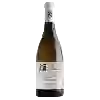
Winery Robert MonnotPommard
This wine generally goes well with
The Pommard of the Winery Robert Monnot is in the top 0 of wines of Pommard.
Details and technical informations about Winery Robert Monnot's Pommard.
Discover the grape variety: Macabeu
The white Macabeu is a grape variety originating from Spain. It produces a variety of grape specially used for the elaboration of wine. It is rare to find this grape to eat on our tables. This variety of grape is characterized by large bunches, and grapes of large to medium size. Macabeu Blanc can be found in many vineyards: South West, Cognac, Bordeaux, Languedoc & Roussillon, Rhone Valley, Provence & Corsica, Loire Valley, Savoie & Bugey, Beaujolais.
Informations about the Winery Robert Monnot
The Winery Robert Monnot is one of of the world's greatest estates. It offers 8 wines for sale in the of Pommard to come and discover on site or to buy online.
The wine region of Pommard
The wine region of Pommard is located in the region of Côte de Beaune of Burgundy of France. Wineries and vineyards like the Domaine Leroy or the Château de Pommard produce mainly wines red. The most planted grape varieties in the region of Pommard are Pinot noir, Cabernet-Sauvignon and Gamay noir, they are then used in wines in blends or as a single variety. On the nose of Pommard often reveals types of flavors of cherry, truffle or clove and sometimes also flavors of game, cheese or rose petal.
The wine region of Burgundy
Bourgogne is the catch-all regional appellation title of the Burgundy wine region in eastern France ("Bourgogne" is the French name for Burgundy). Burgundy has a Complex and comprehensive appellation system; counting Premier Cru and Grand Cru titles, the region has over 700 appellation titles for its wines. Thus, Burgundy wines often come from one Vineyard (or several separate vineyards) without an appellation title specific to the region, Village or even vineyard. A standard Burgundy wine may be made from grapes grown in one or more of Burgundy's 300 communes.
The word of the wine: Sulphating
Treatment, formerly practiced with copper sulfate, applied to the vine to prevent cryptogamic diseases.









